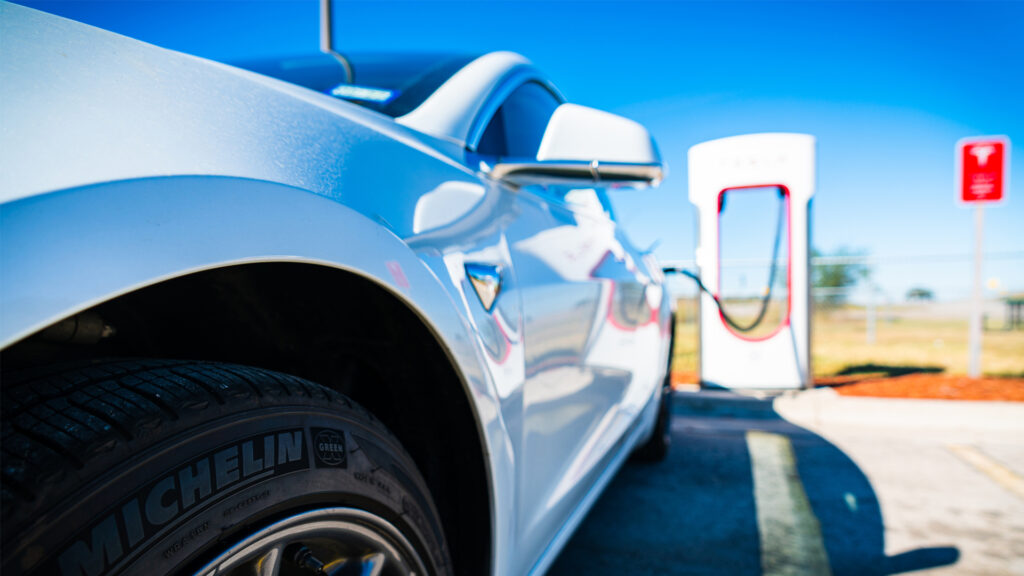By George Riley, Conservatives for Clean Energy
Electric vehicles are driving Florida’s economy forward, generating jobs for the state and substantial savings for individual drivers. From 2021 to 2022, Florida saw a 28% increase in jobs related to electric vehicles (EVs), which significantly reduce maintenance and fuel costs and offer potential savings estimated at $84.5 billion for Floridians by 2050.

Despite the far-reaching benefits of this consumer-driven expansion of EV ownership in Florida, a new tax is being proposed that threatens to undermine these advantages for Floridians. This proposal has wisely been defeated in the past but is now being brought up again and would end up imposing one of the highest EV taxes in the nation – even higher than California.
The bill’s sponsors assert that this new tax will ensure that EV owners pay their share for highway improvements currently paid through the gas tax, but the reality is that transportation funding is a complex and rapidly shifting policy area. Rather than approving a knee-jerk reaction policy that will negatively impact Floridians, state lawmakers should seek to develop a comprehensive and more balanced solution to funding our state’s transportation infrastructure.
There is also little evidence to support the need for such a tax currently. According to research from the state’s Office of Economic and Demographic Research, “gas powered vehicles currently on the road have a reasonable expectation to continue use for at least ten to fifteen years.” That means gas powered cars will still dominate our roadways for quite some time, and it will take years for EVs to meaningfully impact gas tax revenues.
The bottom line is that an arbitrary fee that would ultimately charge EV owners $250 annually is counterproductive and counterintuitive. This fee is almost twice as much as what an average driver pays in taxes when refueling at the pump.
A recent University of South Florida study revealed that a fee comparable to what gas-powered car drivers pay would be between $125 and $150, far less than the amount proposed in the legislation. We need to base taxes on well-founded research and data instead of arbitrary figures to ensure that any measure is fair and doesn’t unintentionally hinder innovative options like EVs.
Lawmakers will have to address these questions in the future, but why have a tax higher than many other states when people are already struggling?

In the current economic climate with unpredictable gas prices, growing inflation and rising interest rates, the last thing anyone needs right now is a tax increase. That doesn’t mean we should completely rule out any kind of fee on EVs in the future, but any such fee should be reasonable and fair for everyone.
During Florida’s last legislative session, conservative leaders in the Florida House of Representatives were wise enough to not even consider the EV tax proposal. Hopefully, that smart decision will carry over to next year’s legislative session – protecting Floridians from this unnecessary and unfair tax.
EVs represent an exciting opportunity for Floridians but moving forward with a new tax now would stifle these innovative advancements at a time when they are just beginning to gain traction. Florida leaders should pump the brakes on an EV tax.
George Riley lives in Tallahassee and serves as the Florida director of Conservatives for Clean Energy. This opinion piece was originally published by the Tallahassee Democrat, which is a media partner of The Invading Sea.
If you are interested in submitting an opinion piece to The Invading Sea, email Editor Nathan Crabbe at nc*****@*au.edu. Sign up for The Invading Sea newsletter by visiting here.




The Invading Sea received the following letter in response to this column:
George Riley objects to the Florida proposal to charge EV owners $250/yr to ensure that they pay their fair share for highway improvements and falsely states that gas-powered drivers pay only between $125 and $150 per year in gas tax.
Based on the Federal Highway Administration estimates, the average car owner drives 13,500 miles per year and various estimates are that average fuel economy is approximately 25.4 mpg. Given that the gas tax for Floridians is 51.825 cents/gallon (33.425 cents FL and 18.4 cents federal), the average Florida driver would pay $275 in gas tax – less that the $250 proposed for EV owners and almost double what Mr. Riley claims.
Furthermore EVs weigh on average 30% more than ICE vehicles, causing more wear on the roadways than comparable ICE vehicles, so they should pay even more. Paying nothing, as they do now, is simply not fair.
While I am not interested in arguing the pros vs. cons of EVs here, I think that $250/yr is a fair and reasonable fee.
Roland Schach,
Boynton Beach
Looking at ONLY the state portion of the gas tax, so using your numbers, a fair equivalent would be more like $175. Keep in mind that those of us who drive EVs pay utility taxes that ICE vehicle owners do not.
The most popular personal vehicle in the US is the Ford F-150. The base 4×2 model is tad under 4400 pounds dry. The more popular F-150’s are even heavier. My Tesla is roughly 300 pounds LIGHTER than the base F-150, so so the road wear dog simply doesn’t hunt.
How about the state adds $175 to EVERY vehicle registration and eliminates the state gasoline tax completely? That would level the playing field.